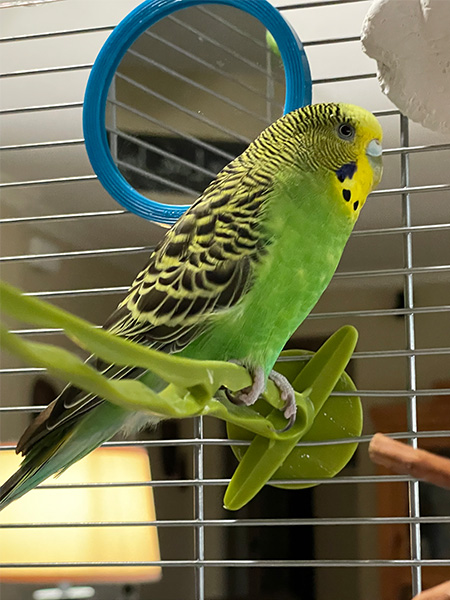Parakeet lifespan and longevity guide for parakeet owners.
What is the Parakeet Lifespan
Understanding how long a parakeet will live in captivity.
A parakeet typically lives between 5 to 15 years, depending on the species and the care it receives. For example, budgerigars, commonly known as budgies, generally live around 5 to 10 years, but with optimal care, they can live longer, up to 15 years or more.
What is the Lifespan of a Parakeet
The lifespan of a parakeet is influenced by various factors including genetics, environmental conditions, diet, and healthcare. Genetic factors such as species type and inherited health conditions can significantly affect longevity. Environmental factors, like the size and setup of the cage and the level of social interaction, are crucial for mental and physical health. A nutritionally balanced diet enriched with appropriate supplements plays a vital role in maintaining health, while regular veterinary care helps in early detection and treatment of potential health issues. Additionally, minimizing stress through a stable environment and providing enrichment activities are essential for extending a parakeet's lifespan. By optimizing these areas, owners can significantly impact the length and quality of their parakeet's life.
Some of the questions we will answer:
- How long do parakeets live?
- What affects the lifespan of a parakeet?
- Do parakeets live long with vitamins?
Parakeets can actually live up to 10-15 years with proper care.

How long a parakeet lives is dependent on many factors. On average a parakeet will live 10 to 15 years in captivity.
ADVERTISEMENT
As an Amazon Associate I earn from qualifying purchases.
Factors Influencing the Lifespan of a Parakeet
Introduction
Parakeets, also known as budgerigars or budgies, are popular pets worldwide due to their vibrant colors and sociable nature. Understanding the factors that influence their lifespan can help owners provide the best care, potentially extending their lives beyond the typical 5 to 15 years.
Genetic Factors
Species Variations Different species of parakeets have varying lifespans. For instance, the common budgie typically lives between 5 to 10 years, while larger parakeet species like the Alexandrine parakeet can live up to 20 years or more.
Inherited Health Issues Some parakeets may inherit genetic conditions that can shorten their lifespan. Breeding practices play a crucial role, as inbreeding can increase the prevalence of these genetic disorders.
Environmental Factors
Cage Size and Environment The size and setup of a parakeet's cage significantly affect its health and longevity. A cage that is too small can lead to stress and physical ailments, whereas a spacious cage with room to fly and exercise promotes better health and longer life.
Social Interaction Parakeets are social creatures that thrive in environments where they can interact with other birds or humans. Isolation can lead to depression and stress, adversely affecting their health.
Diet and Nutrition
Balanced Diet A diet that closely mimics what parakeets eat in the wild is crucial. This includes a variety of seeds, fresh fruits, and vegetables. A nutritionally balanced diet enhances their immune system and overall health, contributing to a longer lifespan.
Supplements Sometimes, additional supplements like vitamins and minerals might be necessary, especially if the basic diet is lacking. Consultation with a vet is essential before adding supplements to prevent overdose.
Health Care
Regular Veterinary Visits Routine check-ups with a veterinarian experienced with birds can catch and treat potential health issues early, significantly affecting a parakeet's lifespan.
Disease Prevention Parakeets are susceptible to various diseases like psittacosis, mites, and respiratory infections. Preventative care, including proper cleaning of their environment and vaccination where applicable, is vital.
Stress and Its Management
Minimizing Stress Stress plays a significant role in the health of parakeets. Factors such as loud noises, lack of routine, or harsh handling must be avoided. Creating a stable environment with regular routines can help reduce stress.
Enrichment Providing mental and physical stimulation through toys, puzzles, and interaction can prevent boredom and stress, fostering a healthier, longer life.
Conclusion
The lifespan of a parakeet is influenced by a combination of genetic, environmental, dietary, and healthcare factors. By understanding and optimizing these factors, owners can not only enhance the quality of their parakeets' lives but also potentially extend their lifespan. This holistic approach to care ensures that these charming birds live full and happy lives.
This detailed exploration reveals that while some lifespan determinants are innate, many are controllable through mindful care and management, offering hope for those looking to maximize their feathered friends' lifetimes.
Our Favorite Parakeet Foods & Treats
Advertisement
Our parakeet eats her normal diet of seed, but we also like to supply treats and chewables as well. Here are our favorites.
As an Amazon Associate I earn from qualifying purchases.







